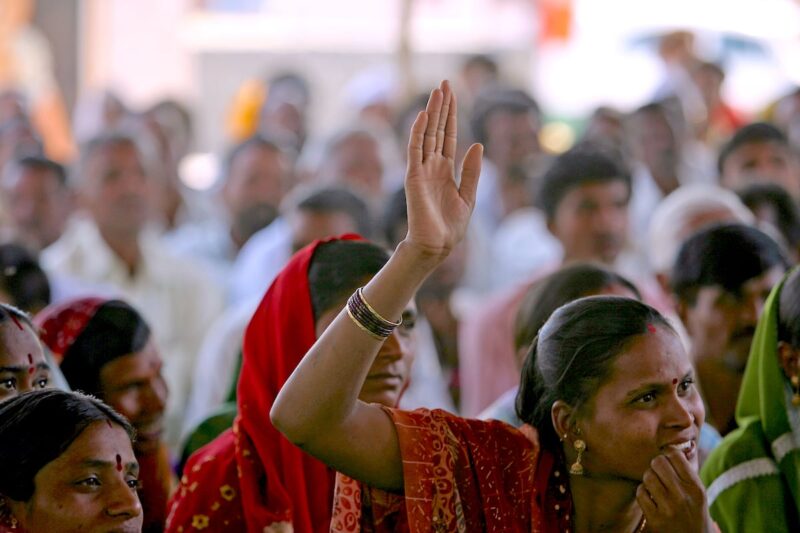Legal Issues
Upholding The Spirit Of Democracy In South Asia -By Vedant Choudhary
Bangladesh elections are the first national elections of 2024 in South Asia and elections in Pakistan, Myanmar, and India are expected later this year. The Bangladesh elections have brought the spotlight on the diminishing spirit of democracy in Bangladesh. That an entire election can be conducted without the confidence of the largest opposition party is not in consonance with the spirit of democracy.

Elections in Bangladesh have been completed, and Sheikh Hasina has been re-elected as Prime Minister. Hasina’s party, the Awami League (AL) has emerged with a clear majority with 223 out of the 350-seat parliament. The Bangladesh Nationalist Party (BNP), which is the main political opposition in Bangladesh, has boycotted the elections, and have called the elections a ‘sham’. The opposition’s demand to have a caretaker government as the country goes to polls had been refused by the ruling party, AL. A caretaker government would have ensured that political power and influence is not abused by the incumbent government. Of the 12 general elections held to date in Bangladesh only four are considered as fair elections, these elections have taken place under a caretaker government. Therefore, the opposition demand was significant.
The 2024 elections have also seen a rise in hordes of ‘dummy’ independent candidates. Reports have pointed out several former AL league members have now stood as independent candidates in a number of constituencies. Experts opine that the dummy candidates have been set up to give the elections a look of normalcy, fairness, and competitiveness, leading experts to term the elections as a ‘one-party election’.
Bangladesh elections are the first national elections of 2024 in South Asia and elections in Pakistan, Myanmar, and India are expected later this year. The Bangladesh elections have brought the spotlight on the diminishing spirit of democracy in Bangladesh. That an entire election can be conducted without the confidence of the largest opposition party is not in consonance with the spirit of democracy. Given the pending elections in South Asian countries it is increasingly important to draw attention to the spirit of democracy in these countries. These countries have consistently deteriorated in democracy markers, and indexes
Pakistan, a constitutional democracy, has long overdue elections (since October, 2023) which are now scheduled for 11th February, 2024. The role of Pakistan’s army in the democratic functioning, and elections has been established throughout its history. The Prime Minister must enjoy the backing of the military to remain in power. Recent events, particularly the assassination attempt on Imran Khan, have cemented this belief. Therefore, as Pakistan goes to the polls in February it would be important to see whether it is the will of the people that prevails, or that of the army. The mere conduction of elections does not make Pakistan a democracy.
Myanmar is ruled by a junta. In 2021, a military coup overturned the lawfully established rule of popular leader Ang San Suu Kii. Even before the coup, the military enjoyed significant powers in the parliament, and in running the nation. Myanmar enjoys a 25% reservation in the parliament. Myanmar is currently being ruled under a state of emergency, under the acting president, Myint Swe, whose term has been extended
General elections in India are expected in May, this year. While allegations on fairness of EVMs and violations of Model Code of Conduct are commonplace, in addition to the electoral process, it is important to evaluate the quality of democracy in India. Not much proof is required to establish the diminishing the democratic values in India. In 2021, Swedish institute, Varieties of Democracy (V-Dem) categorised India as an ‘electoral autocracy’ and not a democracy. On similar lines, US based Freedom House categorised India as a ‘partially-free democracy’. Even if one is to disbelieve the above indexes, one can hardly deny empirical data on human rights violations. News reports of human rights violations, and violation of minority rights have been on the rise in India. It is beyond doubt that there is no space for human rights/minority rights violation in any mature democracy.
As we move into 2024, countries in South Asia are gearing up for national elections. It is important that the spirit of democracy is upheld in these elections. The proof of democracy is not merely the conduction of elections. To uphold the spirit of democracy, and rule of law is the real test of democracy. 2024 elections are also important, since these elections are the first elections after the global pandemic of COVID. The pandemic led to lockdowns, shutdowns, quarantines, and restrictions on movement, and gatherings, leading to a number of rights; infringement. As states enter into 2024, it is time to signal a return to normalcy not merely in the economic process of a country, but also its day-to-day democratic functioning. even in democratic functioning.
Vedant Choudhary reads law at Symbiosis Law School, Pune




















